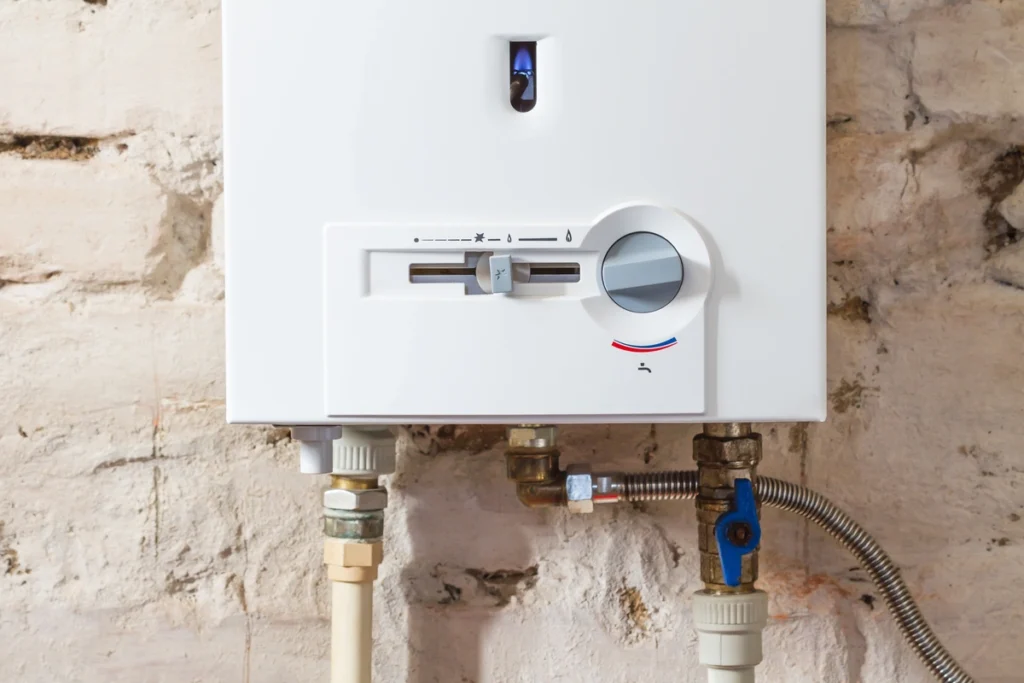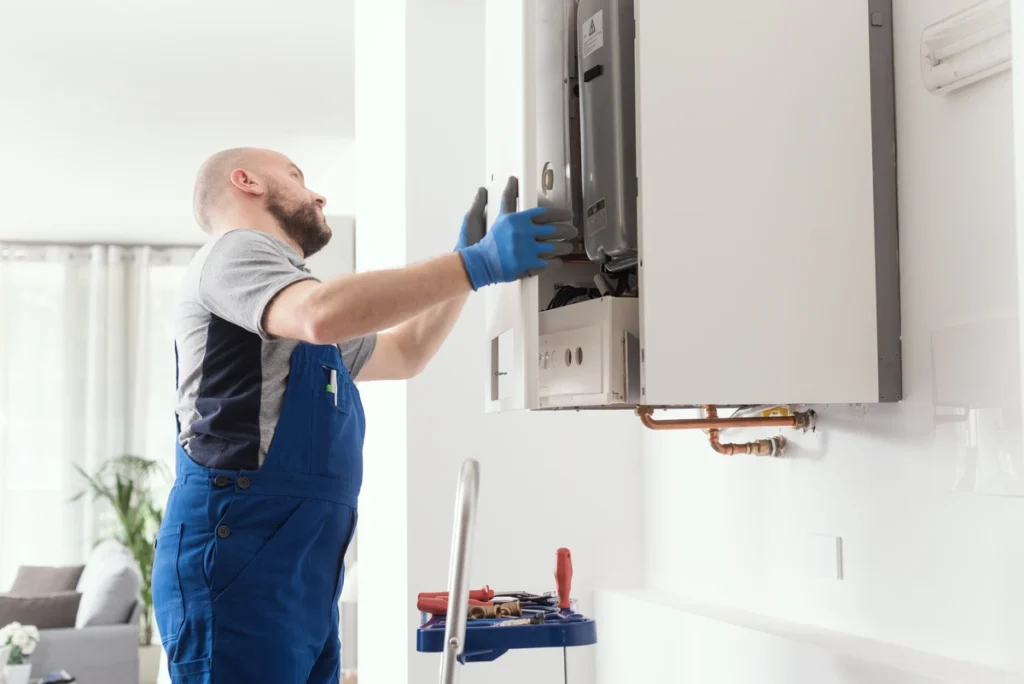Boilers are an integral part of many homes, providing essential heating and hot water throughout the year. However, like any other appliance, they can encounter issues over time, leading to inefficiency, breakdowns, and potentially dangerous situations.
It’s crucial to understand:
- How boilers work
- Recognize signs of damage
- Know how to repair and maintain them
In this comprehensive guide, we’ll delve into everything you need to know about boiler repair, from understanding what a boiler is to finding the right professionals for the job.
What is a Boiler?

Before diving into boiler repair, it’s essential to understand what a boiler is and how it functions. Simply put, a boiler is a closed vessel that heats water or other fluids to generate steam or hot water for various heating applications. Boilers are commonly used in residential, commercial, and industrial settings to provide warmth and hot water for showers, baths, cooking, and space heating.
3 Common Types of Boilers
Boilers come in a variety of styles, including:
1) Combi Boilers:
Combining a water heater and central heating boiler in one unit, combi boilers are compact and efficient, providing hot water on demand without the need for a separate tank.
2) Conventional Boilers:
Also known as regular or traditional boilers, these systems have a separate hot water cylinder to store hot water for later use. They are suitable for larger properties with high hot water demands.
3) System Boilers:
Similar to conventional boilers, system boilers incorporate a hot water cylinder, but they also include other integral components, such as the pump and expansion vessel, within the unit. They are more space-efficient than conventional boilers.
Signs of Boiler Damage
Recognizing the signs of boiler damage early can prevent minor issues from escalating into major problems. Here are some common indicators that your boiler may be in need of repair:
- Strange Noises: Clanking, banging, or whistling noises coming from your boiler could indicate issues with internal components such as pumps, valves, or heat exchangers.
- Leaking: Any signs of water leakage around your boiler should be addressed immediately, as they could indicate a faulty seal, valve, or pressure relief valve.
- Pilot Light Issues: If the pilot light frequently goes out or appears yellow instead of blue, it may signify a ventilation problem, a faulty thermocouple, or issues with gas supply.
- Fluctuating Temperatures: Inconsistent heating or hot water temperatures could be a result of various issues, including a malfunctioning thermostat, airlocks, or sludge buildup in the system.
- Increased Energy Bills: A sudden spike in energy bills without a corresponding increase in usage could indicate that your boiler is working harder than necessary due to inefficiencies or faults.
How to Repair a Boiler: 5 Steps

While some boiler repairs require professional expertise, there are several troubleshooting steps you can take before calling in a professional:
1) Check the Thermostat:
Ensure that the thermostat is set to the desired temperature and functioning correctly. Replace the batteries if necessary.
2) Inspect the Pressure Gauge:
Ideal boiler pressure typically falls between 1 and 1.5 bar. If the pressure is too low or too high, refer to the manufacturer’s manual for instructions on adjusting it.
3) Bleed Radiators:
If certain radiators are not heating up properly, they may have trapped air pockets. Use a radiator key to bleed the air out and restore efficient heating.
4) Reset the Boiler:
Some modern boilers have a reset button that can be pressed to restart the system in case of minor faults or errors.
5) Check for Blockages:
Inspect the boiler’s vents, flues, and pipes for any obstructions that may be impeding airflow or water circulation.
Why You Should Hire a Professional
While DIY troubleshooting can be helpful for minor issues, hiring a professional boiler repair technician is recommended for the following reasons:
- Safety: Working with gas boilers carries inherent risks, including carbon monoxide leaks and gas explosions. Certified technicians have the training and expertise to handle these risks safely.
- Complex Repairs: Many boiler issues require specialized tools, diagnostic equipment, and technical knowledge to diagnose and repair effectively. Professionals are equipped with the necessary resources to tackle complex repairs.
- Warranty Preservation: Attempting DIY repairs or hiring unqualified individuals may void your boiler’s warranty. Hiring a licensed technician ensures that repairs are conducted according to manufacturer guidelines, preserving your warranty coverage.
- Long-Term Savings: While professional boiler repair services may entail upfront costs, they can save you money in the long run by preventing further damage, maximizing efficiency, and prolonging the lifespan of your boiler.
How to Take Care of Your Boiler
Regular maintenance is key to keeping your boiler operating smoothly and efficiently. Here are some maintenance tips to follow:
- Annual Servicing: Schedule annual boiler servicing with a qualified technician to ensure that all components are functioning correctly, and any potential issues are addressed promptly.
- Monitor Pressure and Temperature: Check the boiler pressure and temperature regularly to ensure they are within the recommended range. Adjust as necessary to maintain optimal performance.
- Flush the System: Over time, boilers can accumulate sludge and debris, which can impede water flow and decrease efficiency. Consider flushing the system periodically to remove buildup.
- Replace Filters: If your boiler has a water filter, clean or replace it according to the manufacturer’s instructions to prevent blockages and maintain water quality.
- Ventilate Properly: Ensure that your boiler room or enclosure is adequately ventilated to prevent the buildup of carbon monoxide and other harmful gases.
When to Replace Your Boiler
While regular maintenance can extend the lifespan of your boiler, there will come a time when replacement is inevitable. Here are some signs that it may be time to replace your boiler:
Age:
Most boilers have a lifespan of 10 to 15 years. If your boiler is approaching or exceeding this age range, it may be more cost-effective to replace it rather than continue repairing aging components.
Frequent Repairs:
If your boiler requires frequent repairs or experiences major malfunctions, it may be more economical to invest in a new, more reliable system.
Decreased Efficiency:
Older boilers tend to become less efficient over time, resulting in higher energy bills and reduced heating performance. Upgrading to a newer, more efficient model can lead to significant savings on energy costs.
Visible Damage:
Visible signs of corrosion, leaks, or rust on your boiler indicate significant wear and tear that may compromise its performance and safety.
The Cost of Boiler Repairs and Replacements
The cost of boiler repairs and replacements can vary depending on factors such as the type of boiler, extent of damage, and local labor rates. Here’s a rough estimate of the costs involved:
- Boiler Repair: Minor repairs such as replacing a faulty thermostat or valve typically range from $150 to $400. More complex repairs, such as fixing a damaged heat exchanger or replacing a pump, can cost anywhere from $500 to $1500 or more.
- Boiler Replacement: The cost of replacing a boiler depends on factors such as the size of the unit, type of fuel, and installation complexity. On average, boiler replacement costs range from $3,000 to $7,000 for standard gas boilers and $6,000 to $10,000 for high-efficiency models.
- Additional Costs: In addition to the boiler itself, you may incur additional costs for installation, permits, disposal of the old boiler, and any necessary upgrades to your heating system.
How to Find a Good Team to Help
When it comes to boiler repair or replacement, finding the right professionals for the job is crucial. Here are some tips for finding a reputable boiler repair team:
- Research: Start by researching local boiler repair companies online and reading reviews from past customers. Look for companies with positive feedback, experience, and certifications from relevant industry organizations.
- Ask for Recommendations: Seek recommendations from friends, family, or neighbors who have recently had their boilers serviced or replaced. Personal referrals can provide valuable insights into the quality of service provided by a particular company.
- Check Credentials: Verify that the technicians are licensed, insured, and certified to work on boilers. Ask about their training, experience, and any specialized certifications they may hold.
- Request Quotes: Obtain quotes from multiple boiler repair companies to compare prices, services offered, and warranties. Be wary of unusually low quotes, as they may indicate subpar workmanship or hidden fees.
- Inquire About Guarantees: Choose a company that stands behind its work with warranties or guarantees on repairs and installations. This demonstrates confidence in their ability to deliver quality service.
Trustworthy Boiler Repair Service
Boiler repair and maintenance are essential tasks for ensuring the comfort, safety, and efficiency of your home heating system. By understanding the signs of boiler damage, knowing how to perform basic troubleshooting, and hiring qualified professionals when needed, you can keep your boiler running smoothly for years to come. Remember to prioritize regular maintenance, be proactive in addressing issues, and invest in a replacement when necessary to safeguard your home and family. With the right care and attention, your boiler can continue to provide reliable heating and hot water for many winters ahead.
Contact Palmetto’s expert boiler technicians today to get help with your boiler system.
